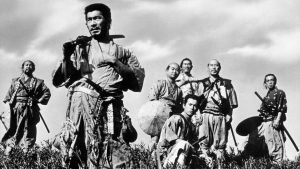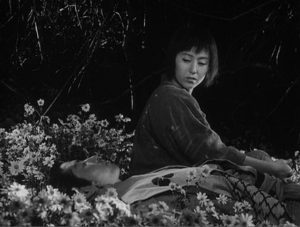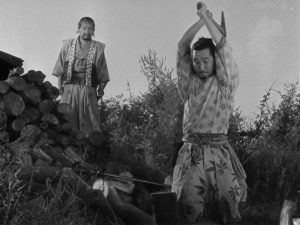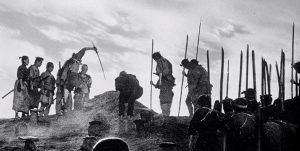Seven Samurai Plot Synopsis
Seven Samurai, originally titled Shichinin No Samurai, is an action-packed Japanese epic samurai drama, made by the legendary Japanese maestro, Akira Kurosawa in 1954. The film follows the story of a village of impoverished and desperate farmers who hire seven samurai to protect the village against bandits.
Seven Samurai is a masterpiece of world cinema; a cult film. In fact, this immortal classic has inspired a whole new generation of filmmakers. The climax in countless films which features the torrential rain trope was first played out in Seven Samurai, where the final battle sequence is fought in rain with the protagonists outnumbered and overwhelmed.

Who were the Ronin?
The warriors that the villagers hire are actually Ronin or masterless Samurai. A Ronin (meaning ‘drifter’ or ‘wanderer’), was a samurai without a lord or master in feudal Japan. A samurai became masterless upon the death of his master or if his services were terminated ignobly.
In feudal Japan, honour was a matter of great pride. And preserving one’s honour/reputation was a matter of life and death. A samurai was expected to commit seppuku aka hara-kiri (ritual suicide) upon the loss of his master. Those, who chose to live, were subject to shame and dishonour. The Ronin was a highly undesirable status and were subject to discrimination by the ruling samurai class and their lords.
Because the masterless samurai could not take up a new trade or work, due to legal hurdles or simply out of pride, many Ronin looked for other avenues to earn a living with their martial skills. Many of the Ronin became mercenaries and provided security to private industries or wealthy merchants. Others turned to the path of crime and brigandry.
In short, the Ronin was the source of lawlessness and fear amongst the peasantry, but many others also used their sword for vigilante justice and helping the weak as seen with Shimada and his team.

Why does Kikuchiyo want to be part of Shimada’s team?
Kikuchiyo is a complex character. The commoner in him desperately yearns for validation from the samurai, especially Shimada, whom he grudgingly admires. He can’t help but be impressed by Shimada for taking so much effort to save a peasant child. But he hides this admiration under an air of gruff insolence and takes affront when Shimada asks him in a caustic tone if he is a samurai.
Later in a humorous scene, an inebriate Kikuchiyo proudly presents his birth certificate to the other samurai to prove he is also one, which brings much mirth and laughter because the birth certificate (which he has obviously stolen) is that of a thirteen-year-old samurai child.
Kikuchiyo wants to join their ranks because he knows that this is the only way he’ll be accepted by the haughty samurai.
His identity is revealed when the samurai show their disapproval over the discovery of armours and weapons (by a gleeful Kikuchiyo) which the farmers had earlier stripped from other dead samurai.
Kikuchiyo launches into a tirade blaming the samurai class for making the farmers stoop to treachery and lies as the only way to survive the violence and oppression wrought upon them by the ruling class. Shimada understands his anger when he realises that Kikuchiyo wasn’t born into a samurai family but was the son of a farmer.
Kikuchiyo is the outsider of the bunch who forms the balance between the samurai and the farmers and hopes to give equal opportunities to all those who want to become great samurai warriors even if they are not born into it.

Why does Manzo focus on his daughter’s love life in the middle of war?
The youngest samurai, Katsushiro falls in love with Shino, the daughter of the farmer, Manzo. Manzo had cut off her long tresses in a fit of fear, hoping that the samurai wouldn’t notice her beauty or at least take her to be a boy. But life has a way of throwing plans in disarray. In short, boy does discover girl and love blossoms. But love in samurai stories never ends well. Not in the way, we would expect it to.
And romance has no place amongst the followers of bushido. Moreover, the union between the daughter of a poor farmer and the scion of a noble samurai family is a strict no-no. The cultural and social barriers in feudal Japan were very rigid and their love was doomed from the beginning. This is why an ashamed Manzo attacks her when he finds her with Katsushiro right after the bandits’ trap.

Who is the first samurai to be killed?
Heihachi, the genial samurai, usually chopping wood is the first casualty of the war.
Kikuchiyo, Kyuzo (the master swordsman), Heihachi (the amiable) and one of the peasants, Rikichi (who’s lost his wife to the bandits) set out to find the bandits’ hideout. The samurai attack and burn down the camp. Rikichi suddenly discovers his wife who has become the bandits’ slave there. Feeling remorseful and ashamed, she runs into the flames and immolates herself. Rikichi, mad with grief, tries in vain to save her. In turn, Heihachi tries to rescue Rikichi but is mortally wounded by a gunshot.

Who hires the samurai to protect the village?
Gisaku, played by the veteran Japanese actor, Kokuten Kodo is the village patriarch and a go-to man for any complicated scenario. In feudal Japan, as in any traditional culture, the village elders are held in high esteem for sage counsel and their pearls of wisdom, based on their decades of experience and an understanding of the ways of the world.
When the farmers approach him with news of the impending bandit attack, he tells them that as a young man, he saw villages all around, devastated by brigands, except one – that which had hired samurai. He advises the villagers that if they want to survive, the only option is to hire samurai. The villagers are aghast – why would proud samurai enlist to serve a bunch of impoverished, starving peasants? So the old man counsels, “Get hungry samurai.”

How does the village defeat the bandits?
After the bandits kill several of the farmers and the samurai Gorobei, Shimada realises that they will strike again now that the village is weak. The remaining samurai and the villagers arm themselves and lay a trap for the bandits.
The next morning, they hide, letting the bandits think that the village is deserted and enter in triumph. The samurai’s ambush is a success as they attack from behind but not before the chief bandit shoots Kyuzo while hiding in the women’s hut. A furious Kikuchiyo runs headfirst into the chief’s musket but manages to slay him before he dies.

What happens to the survivors?
Shimada, the chief Samurai, Shichiroji, Shimada’s old trusted lieutenant and Katsushiro, the youngest Samurai are the only three to survive out of the seven.
The villagers are all in a celebratory mood, having defeated the bandits. In spite of their losses, they are happy, except Shino, who’s fallen in love with the youngest Samurai. She sings the harvest song in a strained voice, betraying the sadness at the thought of her beloved Katsushiro leaving the village, now that the war is over.
Shimada can only look on with a tired gaze and mourn the death of his friends.
Read More: Seven Samurai Movie Review
